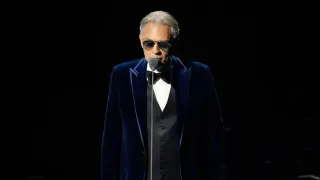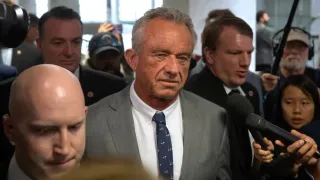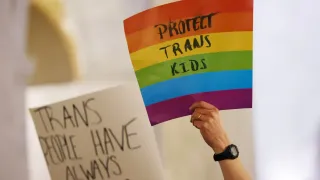October 7, 2024
'Heartstopper' Brings Signature Sensitivity to Sex, Variety Op-Ed Says
READ TIME: 2 MIN.
An op-ed in Variety took note of how Alice Oseman's writing in Season 3 of the Netflix hit series "Heartstopper" stays true to the series' signature sensitivity.
"The first two seasons" of the show, writer Aramide Tinubu said, "were about falling in love," and while the current season finally gets around to acknowledging that teenagers are sexual creatures, Alice Oseman – who also authored the graphic novels the show is based on – "focuses on the work relationships require, and what it means to thrive or perish as new feelings and expectations are unearthed."
It's not just the long-delayed consummation of the love affair between the show's main characters, Charlie (Joe Locke) and Nick (Kit Connor), that anchors Season 3; others in their friend group are finding out what role sex plays in relationships, and also figuring out where they fit on the spectrum of human sexuality and gender identity. Transgender girl (Yasmin Finney) Elle grapples with issues of dysmorphia as she and her boyfriend Tao (William Gao) become sexually active. Meanwhile, Darcy (Kizzy Edgell) embraces a nonbinary identity and the pronouns that come with it, Sahar (Leila Khan) acknowledges her bisexuality, and the group's bookworm, Isaac (Tobie Donovan), pins down that he's asexual and not game for a romance.
"What [Oseman] presents are thoughtful conversations around insecurities, sexual wellness, privacy and the emotions of sexual intimacy," Tinubu said.
Just as crucially, though, Oseman tackles the issue of mental health in a way that clarifies, with empathy and without judgement, the specific issues the show addresses – Elle's dysmorphia, as mentioned above, but also Charlie's eating disorder. These are no mere soap opera contrivances, however; as Tinubu noted, "Nick positions himself as a protector for Charlie. In turn, Charlie is the person who enables Nick to understand himself in his entirety – providing him the assertiveness he needs to help his boyfriend through a very challenging time." In other words, dealing constructively with mental health issues is part of how these teenagers are becoming adults.
And the fact that they are teenagers is central to the show's message. In these reactionary times, it's essential to recall that sexuality is a nearly universal human experience, if even in an absence of interest (as with Isaac). There can be no healthy adulthood if teens are denied the chance to experience sexual development and maturity.
That, as much as the same-sex pairing at the heart of the show, is a key component to the power of "Heartstopper" – not to show teens "how it's done," but to acknowledge that who they are is who they should be. At the same time, the show offers validation to adults who were deprived of those crucial phases of healthy sexual development by societies insistent that the very nature of queer people is somehow "wrong," or a "choice," or a pathology to be "fixed" or "cured." If anything, it's "Heartstopper," and media like it, that offer healing by showing adults who came of age in less accepting times what life could have been like.






